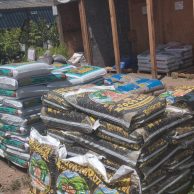 It wasn’t too long ago when Harlequin’s Gardens only accepted cash (and we would extend credit to those customers who didn’t have cash with them). And now here we are, only accepting credit cards to help minimize contact and maximize social distancing. (Thankfully we had set-up our credit card system a few years ago.) We’re continuing to evolve by introducing on-line orders! Who would have thought?
It wasn’t too long ago when Harlequin’s Gardens only accepted cash (and we would extend credit to those customers who didn’t have cash with them). And now here we are, only accepting credit cards to help minimize contact and maximize social distancing. (Thankfully we had set-up our credit card system a few years ago.) We’re continuing to evolve by introducing on-line orders! Who would have thought?
Our Order On-Line Page lists all of our big-bag soil products (composts, fertilizers, potting soils, mulches). Each product has a link to description information, our current inventory count, along with a link to order your desired[Read More]

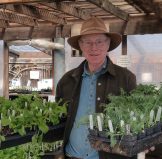
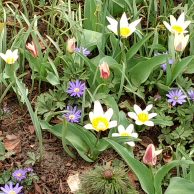 A couple of days ago, I decided to trim back the clumps of Narbonne Flax in my garden, which had been bent over by the heavy snow in March. I grabbed my hedge clippers and cut the first clump down to about 8”. Then I took a closer look at it. Something was in there, and it wasn’t a wad of dry redbud leaves. I had just missed cutting through a Praying Mantis egg case by about a quarter of an inch! A little shaken and much relieved, I inspected all the other clumps carefully before trimming the rest.
A couple of days ago, I decided to trim back the clumps of Narbonne Flax in my garden, which had been bent over by the heavy snow in March. I grabbed my hedge clippers and cut the first clump down to about 8”. Then I took a closer look at it. Something was in there, and it wasn’t a wad of dry redbud leaves. I had just missed cutting through a Praying Mantis egg case by about a quarter of an inch! A little shaken and much relieved, I inspected all the other clumps carefully before trimming the rest. At Harlequin’s Gardens we always knew that nurseries in Colorado are seasonal, but our commitment to local, sustainable, high quality, beautiful, delightful, unusual and innovative is eternal. One of our owners, Eve Reshetnik Brawner, also happened to be a multi genre artist with artisan friends making amazing items without enough ways to sell them. So nine years ago we germinated the idea of a Holiday Gift Market that would not only provide our cherished customers with items that reflected the reputation we’ve tended with our outstanding nursery stock and sustainable garden center items, but would also keep our dedicated and amazing staff working in the off-season.
At Harlequin’s Gardens we always knew that nurseries in Colorado are seasonal, but our commitment to local, sustainable, high quality, beautiful, delightful, unusual and innovative is eternal. One of our owners, Eve Reshetnik Brawner, also happened to be a multi genre artist with artisan friends making amazing items without enough ways to sell them. So nine years ago we germinated the idea of a Holiday Gift Market that would not only provide our cherished customers with items that reflected the reputation we’ve tended with our outstanding nursery stock and sustainable garden center items, but would also keep our dedicated and amazing staff working in the off-season.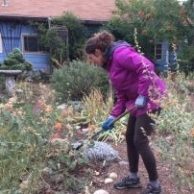 It’s the time of year to ready our gardens for the upcoming fallow winter season and prepare for next year’s growth. We do this knowing that regeneration will be occurring in our soil, with the microbes and with overwintering insects. Here are tips for you to best help this process take place, while still having an aesthetically pleasing garden.
It’s the time of year to ready our gardens for the upcoming fallow winter season and prepare for next year’s growth. We do this knowing that regeneration will be occurring in our soil, with the microbes and with overwintering insects. Here are tips for you to best help this process take place, while still having an aesthetically pleasing garden. 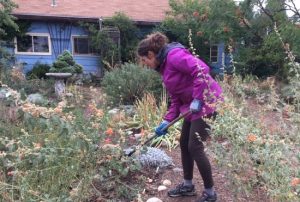
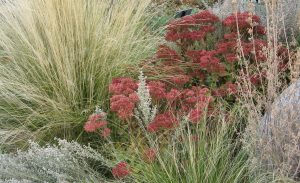
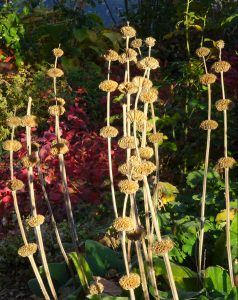
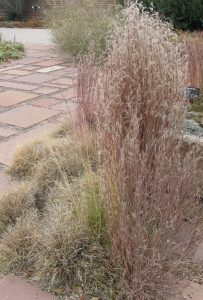 Unless you have an ‘ornamental’ grass that self-sows aggressively, leave grasses and their seedheads standing. If they are ‘cool-season’ grasses, you’ll want to leave them until about mid-February, then cut them to 3” above the ground so they can begin making unimpeded new growth as soon as the soil thaws. Dormant ‘warm-season’ grasses can remain attractive until warm weather comes and don’t need to be cut down until April.
Unless you have an ‘ornamental’ grass that self-sows aggressively, leave grasses and their seedheads standing. If they are ‘cool-season’ grasses, you’ll want to leave them until about mid-February, then cut them to 3” above the ground so they can begin making unimpeded new growth as soon as the soil thaws. Dormant ‘warm-season’ grasses can remain attractive until warm weather comes and don’t need to be cut down until April.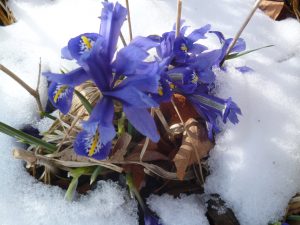
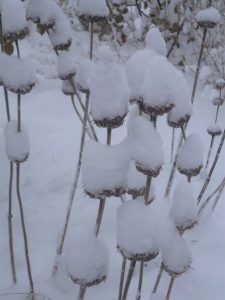
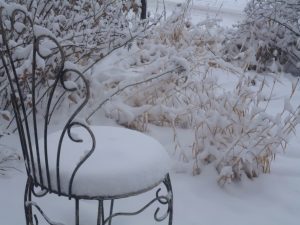
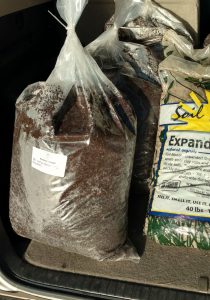 At Harlequin’s Gardens we will not be leaving our jobs on September 20. Instead we will be at work for Harlequin’s where we are always working to help you and the planet. AND we will be giving away one Free bag of compost with each purchase, on Friday, the 20th.
At Harlequin’s Gardens we will not be leaving our jobs on September 20. Instead we will be at work for Harlequin’s where we are always working to help you and the planet. AND we will be giving away one Free bag of compost with each purchase, on Friday, the 20th.
 Non-toxic Herbicides
Non-toxic Herbicides This year’s Taste of Tomato was a blast! We love the new location at Growing Gardens’ Barn, with its’ beautiful view of the Flatirons, easy access, and wonderful staff. The tasting featured 44 different varieties of tomatoes, with Aunt Ruby’s German Green winning the greatest number of votes. Participants brought in some wonderful new varieties this year, including Brad’s Atomic Grape, Thornburn’s Terracotta, and Indigo Cherry. Look for the most popular varieties from this year and previous years when you come to buy your organic tomato starts next spring at Harlequin’s Gardens. Every year we grow 80+ great varieties for all kinds of uses and growing conditions!
This year’s Taste of Tomato was a blast! We love the new location at Growing Gardens’ Barn, with its’ beautiful view of the Flatirons, easy access, and wonderful staff. The tasting featured 44 different varieties of tomatoes, with Aunt Ruby’s German Green winning the greatest number of votes. Participants brought in some wonderful new varieties this year, including Brad’s Atomic Grape, Thornburn’s Terracotta, and Indigo Cherry. Look for the most popular varieties from this year and previous years when you come to buy your organic tomato starts next spring at Harlequin’s Gardens. Every year we grow 80+ great varieties for all kinds of uses and growing conditions! Boulder Valley Rose Society
Boulder Valley Rose Society































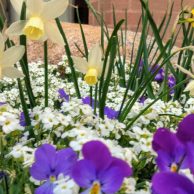 Welcome to Spring, to Harlequin’s Gardens and to another year of the challenges and joys of being alive on Earth, along with the opportunities, work, and healing rewards of gardening. It is both curious and common sense that as we nurture, we ourselves are nurtured.
Welcome to Spring, to Harlequin’s Gardens and to another year of the challenges and joys of being alive on Earth, along with the opportunities, work, and healing rewards of gardening. It is both curious and common sense that as we nurture, we ourselves are nurtured.













 It’s time to plant ‘cool-season’ crops! And for your tomatoes, peppers and eggplants, this is a great week to feed them with Neptune Tomato and Vegetable Fertilizer – well-fed plants provide a better harvest!
It’s time to plant ‘cool-season’ crops! And for your tomatoes, peppers and eggplants, this is a great week to feed them with Neptune Tomato and Vegetable Fertilizer – well-fed plants provide a better harvest!